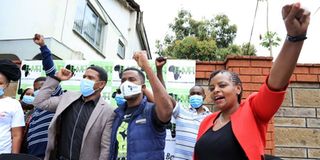Covid-19 laid bare our sore lack of care

Haki Africa and 15 other human rights organisations from around the country chant slogans as they address the media on November 5, 2020 in Nairobi on the formation of a Special Enforcement Unit to enforce Covid-19 regulations by President Uhuru Kenyatta with apprehension and worry based on how the police have in the past used the opportunity to harass, intimidate, torture and even kill Kenyans.
What you need to know:
- In Kenya, a cobbler died after being brutalised by the police for not wearing a face mask.
- There are also several cases of people who were brutalised and are currently bedridden.
If there’s one thing Covid-19 made very clear, it is that we suffer a crisis of care. The pandemic challenged how we show care, who we see as worthy of care, how classist care is, our approaches to care and how to build global care policies.
The lack of care particularly at the institutional level is what has led to punitive measures against the vulnerable.
Many countries operated on a punitive model with regard to the implementation of the Covid-19 protocols. Police brutality was on the rise and, as a result, poor vulnerable people lost their lives for not staying indoors or wearing masks.
In Kenya, a cobbler died after being brutalised by the police for not wearing a face mask. Expectant non-classed women who weren’t able to secure private transportation died because of not being able to get to the hospital during curfew hours.
There are also several cases of people who were brutalised and are currently bedridden due to the grave injuries they suffered. The brutality that people experienced during the pandemic was due to the lack of care on the part of state institutions.
Sadly, the state currently functions as a tool for disciplining its subjects, instead of collaborating with them. The state continues to see poor, vulnerable people as a nuisance, even when it is these very people who carry the state’s essential services on their shoulders.
The violence through which the state speaks and implements its demands needs to change as we craft about a post-Covid-19 society. There should be proactivity in ensuring the state desists from engaging in any issues without care and context. To this end, the leadership needs to understand the context of the care burden.
Gender roles
Data shows that women represent 70 per cent of the global health-care workforce. According to a recent analysis by the International Rescue Committee, women perform more than three times the unpaid care work than men.
It is women’s responsibility to take care of sick family members because of gender roles and, in poor households, this burden is higher. There is need to ensure these vulnerable families have economic and social protection insulations.
State policies geared towards getting the country back on track need take into account gender disparities and dynamics. The state can’t keep operating as if it doesn’t realise that policies affect its women differently.
Tangible equity must be fostered across all sectors of the socio-economic divide. Understanding that women are everywhere and not just in the gender docket would help make the state less violent towards half of its population.
Those who have been lucky to survive this pandemic period have done so as a collective. Covid-19 has exposed the fact that the idea of isolated living is no longer viable.
We all need one another and the state equally needs its people to build resilience. Care is, therefore, an important part of how we collaborate and unite for a possible better society where we all matter.
The writer is a policy analyst. [email protected]





